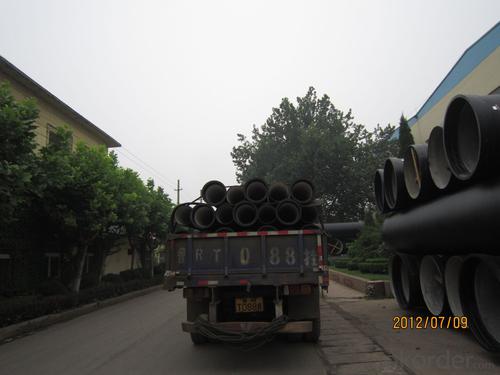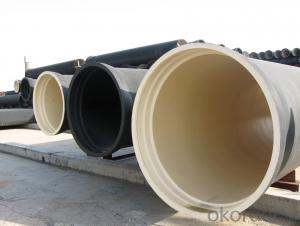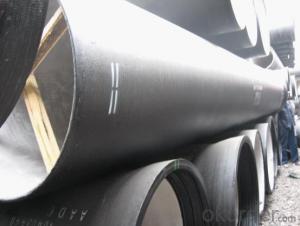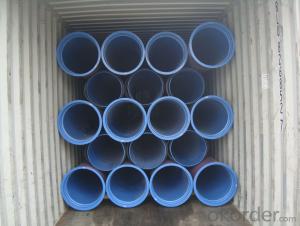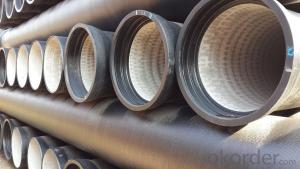T Type Ductile Iron Pipe DN500
- Loading Port:
- China Main Port
- Payment Terms:
- TT or LC
- Min Order Qty:
- 20 m.t.
- Supply Capability:
- -
OKorder Service Pledge
OKorder Financial Service
You Might Also Like
1) The standard of pipe: ISO2531:1998, EN545:2006,K9 K8
2) Effective length: 6m/5.7m
3) Inner cement line: Portland cement lineas per ISO4179
4) Zinc coating: at least 130g/m2 as per ISO8179
5) Bitumen painting: at least 70μm as per ISO8179
6)With 102% quantity of NBR, SBR, or EPDM ring asper ISO4633
7) DN80-DN1200
8) Highstrength, lighter than grey iron, good corrosion resistance, no furring, smallflow resistance, easy fixing, long life tome about 100 yeas
9)Checked by automatic inspection equipment
10) Composition:
Chemical composition | |||
Chemical composition | Ductile Cast Iron Pipe (%) | Grey iron pipe (%) | Steel pipe (%) |
C | 3.5-4.0 | 3.2-3.8 | 0.1-0.2 |
Si | 1.9-2.6 | 1.4-2.2 | 0.15-0.4 |
Mn | 0.15-0.45 | 0.4-0.6 | 0.3-0.6 |
P | ≤0.06 | ≤0.3 | 0.02-0.03 |
S | ≤0.02 | ≤0.1 | 0.02-0.03 |
Mg | 0.03-0.06 |
|
|
11) Feature:
Mechanical properties | |||
| Ductile Cast Iron Pipe | Grey Iron Pipe | Steel Pipe |
Tensile Strength(Mpa) | ≥420 | 150-260 | ≥400 |
Yield Strength(Mpa) | ≥300 | No Confirmation | No Confirmation |
Bending Strength(Mpa) | ≥590 | 200-360 | ≥400 |
Elongation (%) | ≥10 | Neglected | ≥18 |
Brinell Hardness(HBS) | ≤230 | ≤230 | About 140 |
12) T type mechanical joint
13) Packing: in bulk or container
PACKING: 1) Pipesare bundled together with the steel belt.
2) Wooden pieces are put between the pipes.
With good finish, high corrosion resistance and pressure-withstanding capacity.
- Q: Method for cutting cast iron pipe
- Depends on the material and the use of requirements. Ordinary gray iron, if the incision is not strict, such as water pipes. They are all sheared with hydraulic cutting machine, but the incision will not be very smooth. If it is ductile iron, and the incision requirements are high, it can only be used plasma cutting machine. General fittings, if not specifically required, shall not be cut by machining methods.
- Q: Are ductile iron pipes suitable for use in mining tailings pipelines?
- Yes, ductile iron pipes are suitable for use in mining tailings pipelines. Ductile iron has excellent strength and durability properties, making it capable of withstanding the high pressure and abrasive nature of tailings. Furthermore, its corrosion resistance and ability to withstand harsh environmental conditions make it a reliable choice for mining applications.
- Q: How are leaks repaired in ductile iron pipe?
- Leak repairs in ductile iron pipes vary depending on the severity and location of the leak. One technique commonly used involves the application of epoxy-based sealants or leak repair clamps. For small leaks, epoxy sealants are commonly utilized. A specialized epoxy compound is applied to the leaking area, which then hardens and forms a durable seal. The epoxy is carefully spread on the pipe's surface, covering the leak and any surrounding damage. This method effectively addresses small leaks and offers a long-lasting solution. In cases where the leak is larger or more severe, leak repair clamps are often utilized. These clamps secure tightly around the pipe using rubber gaskets and bolts to provide a mechanical seal. The clamp's pressure compresses the gasket onto the pipe, creating a watertight seal and preventing further leakage. Leak repair clamps come in various sizes to accommodate different pipe diameters. Proper preparation of the pipe surface is crucial before applying either repair method. The area around the leak must be thoroughly cleaned and dried to ensure good adhesion of the epoxy or proper sealing with the clamp. It is also essential to adhere to the manufacturer's instructions and guidelines for the chosen repair method to achieve a successful and long-lasting repair. It is important to note that these repair methods are temporary solutions and may not be suitable for all situations. In cases of extensive pipe damage or aging infrastructure, it may be necessary to replace the affected pipe section entirely. It is recommended to seek professional assessment and guidance from qualified technicians or plumbers when dealing with leaks in ductile iron pipes. This ensures proper repairs and minimizes the risk of future issues.
- Q: Can ductile iron pipes be used for large-scale irrigation systems?
- Yes, ductile iron pipes can be used for large-scale irrigation systems. Ductile iron pipes are known for their strength, durability, and resistance to corrosion, making them suitable for various applications including irrigation. These pipes are able to withstand high pressure and can handle the demands of large-scale irrigation systems. Additionally, ductile iron pipes have a long lifespan, reducing the need for frequent replacements and maintenance. They are also cost-effective compared to other materials used in irrigation systems. Therefore, ductile iron pipes are a suitable choice for large-scale irrigation systems due to their strength, durability, corrosion resistance, and cost-effectiveness.
- Q: How do ductile iron pipes handle internal scale buildup?
- Ductile iron pipes possess exceptional resistance to the accumulation of internal scale, making them highly regarded. The material utilized in these pipes displays remarkable resistance to corrosion, effectively hindering the formation of scale deposits. Moreover, the pipes' sleek internal surface considerably reduces the likelihood of scale adherence. In the unlikely event that scale does commence its formation, ductile iron pipes handle it proficiently. The inherent robustness and durability of ductile iron enable it to withstand the pressure exerted by scale buildup. Consequently, the pipes can maintain efficient functionality, even in the presence of some internal scaling, thereby ensuring a dependable water flow. Nevertheless, it should be emphasized that regular maintenance and periodic cleaning remain imperative in order to prevent excessive accumulation of scale and ensure optimal pipe performance. This can be achieved through a variety of methods, including mechanical cleaning, chemical treatments, or high-pressure water jetting. By adhering to proper maintenance practices, the lifespan of ductile iron pipes can be prolonged, while minimizing any potential issues associated with internal scale buildup.
- Q: There are several forms of flexible interfaces for Spigot Cast Iron Pipes
- China's production of "GB 13295-1991 centrifugal casting ductile iron pipe)," GB13294-1991 "provisions of nodular cast iron pipe annealing, centrifugal casting, water for ductile iron pipe pipe, pipe fittings, rubber technical performance, the interface type adopts slip type T shaped interface.
- Q: How do we handle the leaking of the ductile iron pipe?
- A hoop is a component that holds or ties another material with one material. It belongs to the fastener. The hoop holding device is composed of a hoop plate, a wing plate, a tension tie plate, a bolt and an inner liner. There are many kinds of hoop, hoop cable, wire rod hoop, hoop cable, wire hoop, stainless steel hoop are commonly used.
- Q: Will the quality of ductile iron shrink?
- I am a professional casting, I can certainly tell you what he said, there is no basis, you see, the concave is due to do not have a good time, where the hot metal supplement
- Q: Advantages and disadvantages of ductile iron pipes?
- Nodular cast iron has high strength and strong plasticity. The tensile strength of ductile iron is twice that of gray iron, and the yield strength even exceeds that of cast steel. So, the ball compressive strength of ductile iron pipe is much higher than that of cast iron pipes, buried in the ground, the car is not easy to be crushed.
- Q: How are ductile iron pipes protected against stray current corrosion?
- Various preventive measures and protective coatings are employed to safeguard ductile iron pipes from stray current corrosion. Stray current corrosion arises when an electric current flows through the pipe, causing accelerated corrosion and potential harm. To prevent this, the following measures are generally utilized: 1. Electrical isolation: Ductile iron pipes are insulated from other metallic structures by means of insulating materials like rubber gaskets or non-conductive coatings. This insulation obstructs the passage of stray current through the pipe, thereby minimizing the risk of corrosion. 2. Cathodic protection: Cathodic protection is a widely employed technique to shield ductile iron pipes from stray current corrosion. It involves installing sacrificial anodes or impressed current systems near the pipe. These anodes or systems emit a controlled electric current that counters the stray current and guarantees the cathodic protection of the iron pipe. 3. Coatings: Ductile iron pipes are typically coated with protective layers to enhance their resistance against corrosion. A common coating is fusion-bonded epoxy (FBE), which offers a high level of protection against stray current corrosion. FBE coatings act as a barrier, preventing electrical contact between the pipe and the surrounding environment. 4. Monitoring and maintenance: Regular monitoring and maintenance are essential for ensuring the ongoing protection of ductile iron pipes against stray current corrosion. This entails inspecting the protective coatings for any damage or deterioration and promptly repairing or replacing them as required. Additionally, monitoring systems can be installed to detect and measure stray currents, allowing for timely intervention if necessary. By implementing these protection measures, ductile iron pipes can effectively ward off stray current corrosion, thereby prolonging their lifespan and ensuring the integrity of the pipeline infrastructure.
Send your message to us
T Type Ductile Iron Pipe DN500
- Loading Port:
- China Main Port
- Payment Terms:
- TT or LC
- Min Order Qty:
- 20 m.t.
- Supply Capability:
- -
OKorder Service Pledge
OKorder Financial Service
Similar products
Hot products
Hot Searches
Related keywords


